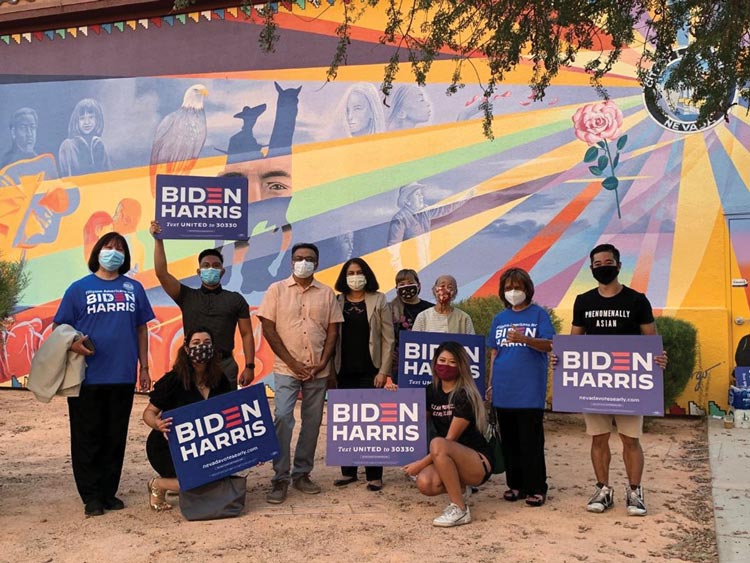
KAMAYAN feast fundraisers, packed phone banking sessions in Tagalog, door-to-door canvassing, and campaign staffers present at community festivals — these have been some of the traditional get-out-the-vote efforts during election season to court Filipino Americans in Nevada.
But as the pandemic continues and Election Day nears, staffers for former Vice President Joe Biden’s presidential campaign have been shifting to socially distanced and digital methods, while still retaining cultural relevancy.
In the Silver State, Asian American and Pacific Islanders (AAPIs) are 10% of the electorate, and Filipino Americans make up the largest ethnic group.
As Fil-Ams are predominantly concentrated in Clark County, the Biden campaign brought on Fil-Am staffers to help woo and connect with the demographic. One of the weekly programs is a phone bank every Saturday calling Tagalog speakers in the state.
“The different programming and outreach…show how mindful our campaign is in how we can reach these voters through our understanding of the community and the values,” said Stefanie Lao, a Nevada coordinated press associate for the Biden campaign. “I’m very aware every day about what our work means to not only the Filipinos who can vote, but also to the Filipinos who can’t but are here in the U.S. to just have a better life.”
Local volunteers have stepped up by mailing out handwritten postcards to remind Fil-Ams to vote and are making their rounds to disseminate in-language literature and signs at ethnic supermarkets and other high traffic locations frequented by community members.
The campaign is also pushing relational organizing, which a lot of community members engage in naturally, but the Vote Joe app makes it easier by going through an individual’s cellphone contacts and matching them with publicly available voter files so they can remind them to vote, whether they’re in the same city or elsewhere.
“There’s still a lot of the traditional methods of the titas going out and reaching out to their nurse friends or retired friends…But that’s really how to win this election — by having folks in the community reminding those close to them,” said Christian Bato, Nevada coordinated coalitions director for the campaign.
Though Fil-Am registered voters are largely enthusiastic nationwide, over half said they haven’t been contacted by the Democratic Party in the past year, according to the 2020 Asian American Voter Survey released by APIA Vote, AAPI Data and Asian Americans Advancing Justice | AAJC
In recent cycles, however, campaigns have begun to recognize the value of the AAPI voting bloc in Nevada, a key battleground state.
Leading up to the state’s caucus, which included preference cards in Tagalog for the first time, Democratic presidential hopefuls made it a point to meet with the growing community, whether it was touring businesses in Chinatown or making stump speeches at local restaurants.
Biden held two campaign events at Harbor Palace Seafood Restaurant along Spring Mountain Road in Vegas’ Chinatown months apart. During his pitch before AAPI Nevadans participated in the caucus, the former vice president spoke to issues direct to the community, such as the Congressional Gold Medal recognition for Filipino World War II veterans and the Obama administration’s record on appointing AAPIs to various positions.
“Events like this mean a great deal. It means that we have arrived at the table and especially in Nevada, the numbers speak highly of us being the margin of victory,” said Gloria Caoile, a veteran labor leader and state director for the Fil-Ams for Biden-Harris, a volunteer group of supporters across the country.
With October commemorating Filipino American History Month, the typical campaign-related kamayan feast — wherein community members are gathered around long tables to eat Filipino food with their hands and are often times joined by local elected officials and candidates — has gone virtual with a “ZOOMustahan” where individuals can share their meals and connect using the video messaging platform.
Focusing on the month’s theme of the “history of Fil-Am activism,” the campaign is also increasing its voter and identity education around Fil-Am roots in labor, activism, and electoral engagement.
“A lot of the voter education has to do with relating them to stories about our culture and histories [and] views on activism. Union leadership and movements are at the backbone our history here as Filipino Americans,” Bato said. “When it comes to taking a stand at the I-Hotel in San Francisco and even electorally, when Larry Itliong was the first [Fil-Am] DNC delegate. That’s because this is the party that really embodies a lot of these same goals that impact the Filipino American community.”
While the 50 and older group still comprise a majority of Fil-Am voters in Nevada, the eligible Gen Z and millennials bloc is not to be neglected, according to the Fil-Am staffers.
The state campaign is supporting the AAPI Democratic Caucus of Nevada, which along with the Pilipino Los Angeles Democrats, KAYA: Filipino Americans for Progress, and the national Fil-Ams for Biden-Harris group, is hosting a virtual GOTV concert with rapper Ruby Ibarra on October 28.
“Although [Biden] wasn’t the preferred candidate for a lot of young Fil-Ams, a lot of his policies would still be a giant benefit compared to Donald Trump,” said Marcus Manabat, a Fil-Am millennial campaign field organizer in Las Vegas. “Another important thing to notice for progressives is that a lot of the policies have had input from the Bernie [Sanders] camp. It’s really valuable that he’s still willing to listen and take in new ideas.”
Nevada is among the states that will be sending mail-in ballots to all active registered voters ahead of Nov. 3. Early voting in Clark County will be held from October 17-30, so voters are encouraged to hand in their ballots at convenient drop-off sites to keep themselves and others safe.









